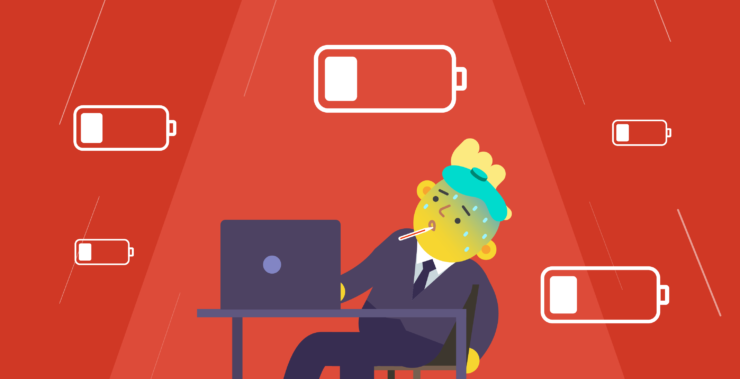Mental exhaustion – this is a ride that so many people are on today and just so desperately want to get off.
If this is where you’re at, don’t feel ashamed. Don’t feel isolated. And certainly don’t assume that you’ll be here forever. There are solutions (quite a few of them, in fact).
In this post, you’ll learn:
- What mental exhaustion is
- Symptoms
- Side effects
- The cause
- How to overcome mental exhaustion
- How long it might take to overcome
- And how to comfort someone who is mentally tired
Be sure to use productivity tools like Chanty for better workload management to prevent employee burnout and mental exhaustion.
What is mental exhaustion?
Mental exhaustion is the feeling of extreme mental fatigue. Usually brought on by excessive “people work” and overwork, mental exhaustion can cause extreme tiredness, headaches and body aches, and even depression. It may be manifested as being “drained” even after resting, where the usual ways of relaxing or even sleep don’t quite get you back on track. If it isn’t treated, it would make your relationships, job performance, and even your general health deteriorate. Relatedly, a loss of immune function increases a person’s susceptibility to various diseases.
Need a reprieve from this heavy topic already? See if you relate to these funny but oh-so-real mental health memes.
What are the mental exhaustion symptoms?
How do you know if you’re experiencing mental exhaustion? They can show up in your emotions, behavior, and even physically in the way you move and interact with others.
Mental exhaustion often creates a cycle of symptoms, with each one exacerbating the others, making it feel like an endless loop. The most common symptoms are listed below:
Emotional symptoms:
- Lack of interest, sense of dread, lethargic
- Moodiness, irritability, anger
- Constant worry
- Difficulty concentrating
- The feeling of overwhelm, stress
Physical symptoms:
- Headaches, body aches, muscle tension
- Frequent illnesses, such as colds and flu
- Sleep issues
- Zoning out
- Exercise seems harder
- Changes in appetite and weight
- High blood pressure, irregular heart rate
Behavioral symptoms:
- Can’t sit still or relax
- Avoiding people you’d usually enjoy spending time with
- Drink alcohol or use other substances to help cope with your situation
- Forgetfulness
- Lashing out
Side effects of mental exhaustion
With the symptoms above, the side effects shouldn’t surprise you.
Mental exhaustion will negatively impact your work relationships, performance, and future health. Prolonged mental exhaustion can significantly affect your cognitive function and make it difficult to retain information or make clear decisions.
See below for a more extensive list:
- Lack of follow-through
- Extreme tiredness
- Reduced performance at work
- Making simple mistakes that you wouldn’t otherwise
- Inability to follow complex ideas or resolve challenges
- Relationship issues
- Depression or anxiety
What causes mental exhaustion?
A study of occupational and environmental health found that mental exhaustion can stem from working long hours with people in need.
The constant demands of caring work, whether in health care, customer service or social work, exacerbate feelings of mental fatigue and can eventually lead to burnout.
More recently, an emotional exhaustion study was performed on working mothers. They confirmed the increased level of exhaustion among women trying to juggle a demanding job while raising children. This is widely recognised as a form of “role overload”, where individuals juggle multiple stressful responsibilities without adequate rest or support, leading to chronic exhaustion.
Aside from the above, mental exhaustion can also stem from:
- Emotional suffering
- Chronic nervousness
- Stress
- Poor self-care
Can you identify with any of these causes?
Emotional suffering
Mental exhaustion can come from constant emotional strain.
Constant frustration and toxic work relationships can weigh heavily on you. If this strain exists for long periods of time, mental exhaustion can set in.
Nervousness
Have you always been a nervous person in a constant state of worry? Maybe you find yourself concerned about things that are far out of your control.
While it may not seem like a big deal, it can affect your health–and perhaps even put you in a state of mental exhaustion.
Constant anxiety and worry, whether from work, home life or social pressures, can lead to chronic mental fatigue as the brain is constantly “on alert” trying to manage stress and anxiety.
Stress
Do you have a stressful job? Are you juggling too many things at once? Are your finances a wreck? These could cause mental fatigue as well.
Workplace stress is a major contributor to mental exhaustion, especially when employees are faced with unrealistic expectations, excessive workloads or lack of recognition.
With work and your daily life, you simply need to dial it back. Your suffering health isn’t worth keeping a particular job or checking the box on every one of your commitments. Cut out whatever you can.
With finances, it’s likely more challenging.
Financial stress might heighten the effects of job-related burnout, especially if one has a high-pressure job that keeps them anxious and leaves them with little energy to focus on anything else in life.
If you’re living paycheck-to-paycheck or going backward financially, the cause is usually an overabundance of debt.
If you want to relieve financial stress, get rid of the debt. Harvard suggests using the debt snowball – a method of paying your debts off from smallest to largest – because you’ll see immediate progress and be more likely to stay motivated to the end of your debt payoff journey.
Poor self-care
If you like to do everything for everybody and rarely say no, you might be experiencing emotional exhaustion.
This is all the more common among people who sacrifice their needs to accommodate other people’s expectations, either in the family, a personal relationship, or at work.
When you say “yes” to everyone else, that likely means you’re not saying “yes” to your own needs. If you don’t eat well, exercise, or form relationships with others, mental exhaustion could eventually happen.
Indeed, poor self-care is usually an aftermath of over-investing in a stressful job or failure to recognize the importance of rest and boundaries.
How to overcome mental exhaustion
At this point, you may have identified that you have mental exhaustion—and hopefully discovered the source. But here’s the important part—how to get better and actually feel like yourself again.
Here are the top ways to reduce mental fatigue:
- Start every morning with some motivational activities.
- Consider a career change.
- Talk to your boss about reducing your workload.
- Tackle fewer personal agenda items.
- Practice gratitude.
- Get on top of your finances—consider the debt snowball method.
- Become more organized.
- Have a period of “no” (where you just say no way more often in your personal life).
- Avoid napping during the day (to have a sound sleep at night).
- Get outside and into nature.
- Listen to instrumental music.
- Consider a change to your medication.
- Eat healthier food and drink more water.
- Do something new and different—something fun that’s just for you.
- Forced quiet time (literally do nothing by sitting, closing your eyes, and reflecting).
- Reduce social media (or cut it out of your life entirely).
- Consult a coach or therapist.
How long will it take to stop feeling drained?
You’re mentally and emotionally exhausted—perhaps even physically exhausted. How quickly could you start feeling better?
As you may have guessed, no one will have an exact answer for you. Everyone’s situation is different, and each person will respond differently to the suggestions above (to cure mental exhaustion). However, there was a study performed that gives us a glimpse into a potential timeline.
Rehabilitation in the boreal forest
In the Swedish territory, six researchers conducted a test where they took participants suffering from stress-related exhaustion out to the various local forests to see if their stress levels would reduce and if their lives would be positively affected by the experience.
Each participant was taken to the forest twice a week for eleven weeks.
After that short span of time, the researchers reported a significant positive impact on all participants’ mental states.
Potential reprieve in three months or less
Again, it all depends on your current mental state, but studies have shown that improvements in your mental health can be made rather quickly.
Find the methods that work best for you and implement them into your life as quickly as possible.
And, of course, don’t take our word for it. Please consult a medical professional as well.
Read more: From Exhausted Founder to Successful Entrepreneur (Free eBook)
When should you seek help?
You know your body and mind far better than anyone else. If you’re struggling, have no one to talk to, and are finding it difficult to inject positive changes into your life, you should seek help for your current situation.
Remember, seeking help is not a sign of weakness; it’s a bold step toward healing. Whether it is daily stress that has overcome you or you have been feeling mentally knocked out for weeks, the earlier the problem is addressed, the better it is before it grows into something worse.
If you’re on the fence about whether you need help, you’re still probably better off seeking professional guidance. Don’t be shy on this one. Sometimes, an outside perspective can help – a person trained to offer coping strategies or therapeutic techniques that provide clarity. Seeking help and not needing it is far better than ignoring your situation until it’s too late.
If you are not ready for therapy or formal support, consider reaching out to a trusted friend or family member. Being able to talk with someone who can offer an ear and not judge you can make quite a big difference. Do not underestimate the power of social support in your journey of mental well-being.
How to comfort someone who is mentally tired
Maybe you’re not the one who’s mentally fatigued. Perhaps you’re reading this for a friend. Or maybe you’re a company that wants to champion the mentality and emotional stability of your employees.
What can you do to care for someone that’s struggling?
First, I’d suggest not asking them for anything. They already have enough on their plate without you piling yet one more thing on there. Give them space to express their feelings without pressure. Sometimes, just listening attentively can be more helpful than offering advice.
Second, be patient and understanding. Mental exhaustion causes people to say things they don’t mean. Forgive quickly, and continue to offer your help. Keep in mind that mental exhaustion can often make a person retreat into themselves emotionally or even become cantankerous. Be gentle and don’t take it personally.
Third, understand that you can’t change your friend’s situation for them. Do your best to help, but don’t be mad if they don’t change and improve immediately. Understand that sometimes recovery from mental exhaustion may be gradual. Sometimes all you can do is be there with them as they take baby steps to heal.
Fourth, offer help. Like, really offer it to them. Don’t just flippantly say, “Let me know if you need any help.”Be specific about how you can help them. Rather, say, “Can I help you with meal prep?” or “I’ll take care of your laundry today.” Go to their home. Look around. Offer them to help clean dishes, and just start doing this for them. Tell them that you don’t mind at all and want to. By offering them your help in performing these everyday tasks, you’ll not only ease their psychological load but also make sure they know you are concern for their well-being. Chances are they’ll have a hard time accepting your help, but reassure them it’s where you want to be, and it’s what you want to do. No trouble.
Lastly, if the individual you’re supporting is willing, encourage them to consider professional help when needed. Those experiencing mental exhaustion are often unaware of the stage of burnout they may be in until it’s been brought up by someone else.
Mental exhaustion quotes
Mental exhaustion can make you…well…exhausted. So let’s liven things up a bit with some funny and very true quotes on the topic:
“I am tired of being tired and talking about how tired I am.” – Amy Pochler
“I’ve got a great ambition to die of exhaustion rather than boredom.” – Thomas Carlyle
“I’m not depressed. I’m not broken. Or empty. I’m exhausted. Emotionally. Spiritually. Physically. I just need someone to hold me. Someone real. Someone who knows what it’s like to have a deep heart.” – R. M. Drake
“I’m exhausted from trying to be stronger than I feel.” – Book Toucan
“I really am waking up tired… Like, what did I even sleep for?” – @Rexgemz
How to come back from being mentally exhausted: Summary
The article’s almost over. What did we learn?
Mental exhaustion is extreme mental fatigue—often brought on by working many hours with countless patients in the healthcare industry or by juggling parenthood and a demanding job. There are other cases, of course, but those are the most common.
Symptoms of mental exhaustion are emotional, physical, and behavioral—mainly fatigue, headaches, illness, lack of sleep, forgetfulness, and turning to substances.
So what often happens to those experiencing burnout?
They perform terribly at work, they have relationship issues, and they can slip into depression or anxiety.
To combat the depleted feeling, something needs to change in your life. You need to get away from the cause and start taking action to make yourself feel better.
This includes actions like:
- A new job
- A renewed understanding with your boss
- Starting on a program to overcome financial struggles.
- Going for a walk outside
- Adopting a healthy lifestyle
- A medication change
Whatever it is, something has to change. Have you ever heard the definition of insanity? “Continue to do the same thing over and over and expect a different result.”
Stop the insanity. Do something different. Be a champion for yourself.
This article was written by the authors of LifeAndMyFinances.com, where they commonly help people escape the emotional exhaustion of their finances.









Add comment